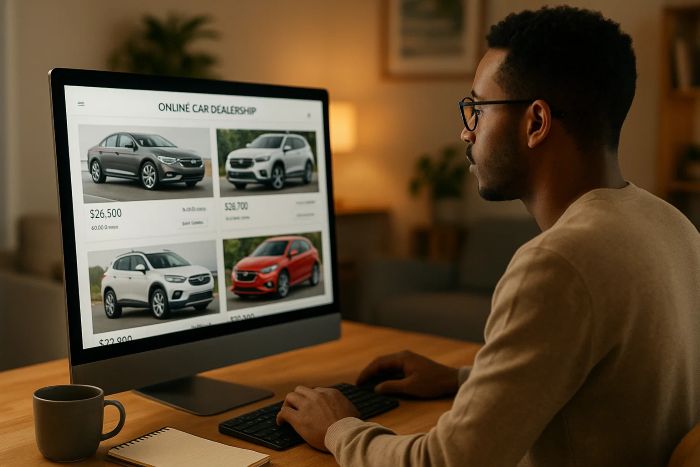Shopping for a car online feels easy, almost casual. Click a few listings, scroll through glossy photos, maybe even consider importing from abroad. But digital car buying comes with risks. Too many buyers discover after the sale that their new ride hides old problems, more miles, or unexpected repair bills.
Key Takeaways
- Online car buying can be risky; hidden problems often surface after the purchase.
- Watch for payment packing tricks that include unwanted extras in your monthly payment.
- Be cautious of phantom add-on fees that dealers might sneak in late in the process.
- Title washing and VIN cloning scams can mask a vehicle’s true history; always verify VINs and titles.
- Use resources like NHTSA for recall checks and compare vehicle history reports from trusted sources.
Table of Contents
9 Red Flags in Digital Car Buying
You deserve a deal that matches the listing. Let’s look at some red flags to watch out for, so you keep your money and peace of mind where they belong.
1. Payment Packing Tricks
A seller quotes a monthly payment that looks easy on your wallet. What they do not say is that it hides unwanted extras. These might be service plans, perhaps theft protection, or paint sealant you never requested.
Check every fee and add-on in the final contract. Run the numbers yourself using an online loan calculator. A payment should only cover the car, not invisible extras tucked away.
2. Phantom Digital Car Buying Add-On Fees
Ever notice an “administrative” or “protection” fee pop up late in the process? Sometimes a dealer slips in charges for extras you never agreed to. This might include things like fabric protection or key replacement.
These costs, often hidden in a separate sticker, raise the total price quickly. Review the breakdown line by line. Reject fees you did not approve. Your bill should reflect only what you intended to buy.

3. Title Washing Schemes
A car might look flawless on paper, yet its past tells a different story. Sometimes sellers “wash” a vehicle’s title by moving it across state lines to erase records of serious damage or salvage status. This can hide accidents or flood history.
If you spot strange gaps or too many state transfers, that’s a warning sign. Let’s say you’re in the Golden State. When legal help is needed, Auto Law Firm offers guidance on auto fraud and lemon law protections in California.
4. VIN Cloning Scams
Imagine paying for a car that looks clean but actually wears a stolen identity. Cloning is when a scammer copies a real vehicle’s VIN and slaps it onto another car, usually stolen or salvaged. Always double-check the VIN on the car, title, and sales paperwork. Cross-reference it with a trusted database like the NICB’s free VINCheck before sending any payment.
5. Faked Vehicle History
A seller emails a glowing vehicle history report. Seems official, right? But some reports are edited or generated to hide past accidents, odometer rollbacks, or flood damage. You want to compare the seller’s report with a third-party VIN report source like Carfax or the National Motor Vehicle Title Information System. Real digital car buying records should always match across platforms and paperwork.
6. Click-to-Sign Pitfalls
These are the contracts that rush you through. Click, and you could agree to anything—extra fees, binding arbitration, even “as-is” clauses. Before you click, read the terms. Print the documents for review. Compare what you see with what was promised earlier. Take your time, and never let urgency replace careful review.
7. GPS Kill-Switch Risks
Some lenders require a GPS device in your car, claiming it helps with theft recovery or lower rates. The real catch? These devices sometimes let a dealer remotely disable your car if a payment is missed, sometimes by mistake. Check your contract for mention of remote disabling. You want full control of your vehicle, not surprise shutdowns after a glitch or clerical error.
8. Missing Recall Details
A used car might look perfect, but it could hide a recall issue. Some sellers skip recall disclosures, hoping buyers will not check. Visit the NHTSA website and run the VIN for open recalls before you commit. If anything shows up, ask for proof of repair. Peace of mind comes from knowing your digital car is safe, not just shiny.
9. AI Listing Fakes
A listing grabs your eye with great photos and a tempting price. Yet behind the screen, an AI tool may have generated fake images, specs, or even chat replies. You can run a reverse image search to check if the photos appear elsewhere. If a seller avoids phone calls or live video, consider it a clear warning to move on.
Conclusion
Spotting trouble signs makes a big difference when shopping for a car online. Each careful step, from double-checking documents to questioning sudden fees, keeps your purchase on track. Trust in the digital car buying details protects your wallet and puts you in the driver’s seat for good.











